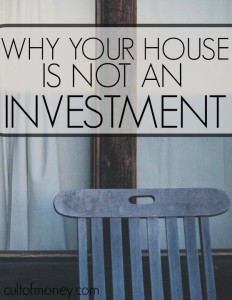 I’m the type of person who has to learn lessons the hard way.
I’m the type of person who has to learn lessons the hard way.
And sometimes I feel really stupid when I do. It’s like I should’ve known this stuff all along. But no, I chose to believe the mass advice that is normally completely wrong and backed by a hidden agenda. #GoFigure
One thing I’ve recently learned the hard way is that the house you buy to live in isn’t a financial investment. It just isn’t.
Here’s why.
# 1 – You DID NOT Buy It as an Investment
Let’s go ahead and get the obvious out of the way. The vast majority of the population did not buy their homes as investments.
Not at all.
There’s nothing wrong with this, it’s just a fact that can be hard to admit. You bought your home because it seemed like a great fit for you and your family. You loved the land, the kitchen, the beautiful backyard etc.
You didn’t buy because the house was in an up and coming neighborhood and through ten years of sweat equity you’d be able to sell and make thirty grand. No, you bought out of emotion. And so did I.
There’s nothing wrong with this. Let’s just not pretend we bought our houses as investments, because we didn’t.
(Of course, there are exceptions to this. If you’re an exception then you already know it.)
# 2 – Your House is Worth What Someone Will Pay You
My husband bought his first house in 2006. This was before the local market crashed and every other home was in foreclosure.
He paid $86,500. Since then we’ve done a myriad of things like replace the heating system, completely gut and remodel the bathroom, replace pipes, had the house professionally painted and more.
We’ve put more than $10,000 in the house and just went under contract for $84,000. That’s not even counting the several thousands of dollars paid in closing costs – both from buying and selling the home. (Which are both very real costs of owning and selling a home.)
Does it look like our house was a smart investment now?
With as many homes for sale as there are in my neighborhood we’re probably lucky we got an offer at all.
Houses do not always appreciate. Real estate markets crash. People over improve their homes. The list could go on and on. There are a ton of reasons why you may never get out of your house the cash you’ve put in.
# 3 – Asset vs. Liabilities
This is a much more extreme way of looking at things. This line of thinking comes from Robert Kiyosaki. (It’s been a long time since I read the book so I’m paraphrasing here.)
As asset is something that earns you money. A liability is something that costs you money.
A normal balance sheets shows your home as both an asset (the value of the home itself) and as a liability (your mortgage.) But for the bank your mortgage is their asset. Your home makes the bank money and costs you money.
If an asset is something that earns you money then your house isn’t an asset, it’s a liability. Even with a paid off mortgage you have to cover property tax, homeowner’s insurance, and maintenance.
I’m not saying this way of thinking is right or wrong. Simply something to take into consideration.
So, Should You Never Buy a House?
That is not what I’m saying.
I just bought my “forever” house. It absolutely is not a financial investment. If anything, it’s an investment in my happiness. It’s where I want to be for the rest of my life.
I think it’s important for us to recognize that when we go to purchase a home to live in we are looking at it with a completely different set of eyes as someone who is investing.
Real estate investors are pretty smart. They know that even when the housing market crashes they’re still going to be collecting rents. The fact that the value of their homes (assets) may go down is irrelevant. In the event of a housing crash the rental market becomes more competitive and houses are on clearance sales. For investors the cash is still flowing.
But when you and I buy a home to live in we aren’t thinking of things like these. No. Instead we’re picturing our kids running around outside, our families gathering on the back deck, and in my case, a space for animals to roam.
There’s nothing wrong with this.
When you need to sell you might make some money and you might lose a hell of a lot of money. Either way, let’s not pretend we bought the home we’re living in as an investment. Because we didn’t.

Alexa Mason is a freelance writer and wanna be internet entrepreneur. She is also a newly single mom to two beautiful little girls. She chronicles her journey as a single mom trying to make it big at www.singlemomsincome.com.
